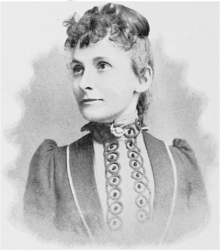Annah Robinson Watson
Annah Robinson Watson (1848–1930[1]) was an American author, the founding member and president of the Nineteenth Century Club,[2] and a collector of American folklore.
Annah Robinson Watson | |
|---|---|
 | |
| Born | Annah Walker Robinson 1848 |
| Died | 1930 (aged 81–82) |
| Occupation | Writer, poet |
| Nationality | American |
| Notable works | Some Notable Families of America Of Sceptred Race Passion Flowers |
| Spouse | James H. Watson |
| Children | Archibald Robinson Watson James Henry Watson |
Early life
Watson was born Annah Walker Robinson on the Taylor homestead, "Springfields", near Louisville, Kentucky, to Mary Louise Taylor Robinson and Archibald Magill Robinson.,[3] she was the granddaughter of Hancock Taylor, a brother of President Zachariah Taylor.[4] Watson was described as a "romantic, poetic, imaginative child". After some years in the countryside, her family moved to Louisville, and Watson received an education there and later in Chicago.[3]
Written works
After completing her studies, she entered society as a poet. She continued to write, publishing "Baby's Mission", which received widespread popularity and was published in the London journal Chatterbox. She also won a contest in the New York Churchman for best lullaby. In addition to publishing many poems and prose works under her own name, she also extensively published unsigned work, including reviews and editorials.[3]
In 1870 Watson married James H. Watson, the son of a Mississippi judge. She later settled with her family in Memphis, Tennessee, where her husband practiced law. She published tales and superstitions collected from African-American peoples, apparently in the dialect of the teller, and speculated on a type of ethnographic racialism.[5] Her works include Some Notable Families of America, Of Sceptred Race, Passion Flowers and a paper—"Comparative Afro-American Folk-Lore"—read at the International Folk-Lore Congress of the World's Columbian Exposition of 1893.[6]
In Memphis, Watson was a founding member and third president of the Nineteenth Century Club, the largest woman's club in the South.[3] At the time, clubs were viewed as schools where women were able to extend their intellectual endeavors. The club was tied to the Women's suffrage movement, though the members made it clear that theirs was a very feminine brand of activism, often justified with explanations of how it helped women to become better in family life.[7] Although Watson cautioned against pursuing activism at the expense of the family, she noted "a new sense of power and capacity among American women", and published The New Woman of the New South & the Attitude of Southern Women on the Suffrage Question with suffragist Josephine Henry in 1895.[8]
In 1913, General James Grant Wilson submitted Watson's poem titled "The Siege of Vicksburg, a Battle of the Bluffs" on her behalf for the 43rd reunion of the Society of the Army of the Tennessee.[9]
In 1914, Watson published Golden Deeds on the Field of Honor: Stories of Young American Heroes, which focuses on the Civil War, primarily from the Southern perspective.[10]
References
| Wikisource has original text related to this article: |
- Merrow Egerton Sorley (1935). Lewis of Warner Hall: The History of a Family, Including the Genealogy of Descendants in Both the Male and Female Lines, Biographical Sketches of Its Members, and Their Descent from Other Early Virginia Families. Genealogical Publishing Com. p. 648. ISBN 978-0-8063-0831-9.
- Wedell, Marsha (1991). "The Nineteenth Century Club". Elite women and the reform impulse in Memphis, 1875-1915 (illustrated ed.). Univ. of Tennessee Press. pp. 81–82. ISBN 0-87049-704-9.
- Frances Elizabeth Willard; Mary Ashton Rice Livermore (1897). American Women: Fifteen Hundred Biographies with Over 1,400 Portraits: A Comprehensive Encyclopedia of the Lives and Achievements of American Women During the Nineteenth Century. Mast, Crowell & Kirkpatrick. p. 752.
- Annah Robinson Watson (1910). Of Sceptred Race,. Early Printing and Publishing Company. p. 158.
- Sundquist, Eric J. (1993). "The Color Line". To wake the nations: race in the making of American literature (3, illustrated ed.). Harvard University Press. ISBN 978-0-674-89331-3.
- The International Folk-Lore Congress of the World's Columbian Exposition, Chicago, July, 1893 1898 Charles H. Sergel pp. 327–40
- Marsha Wedell (1991). Elite Women and the Reform Impulse in Memphis, 1875-1915. Univ. of Tennessee Press. pp. 1–. ISBN 978-0-87049-704-9.
- "Guide to the Lindseth Collection Of American Woman Suffrage,[ca. 1820-1920]". rmc.library.cornell.edu. Retrieved 2015-12-15.
- Society of the Army of the Tennessee (1915). Report of the Proceedings of the Reunions of the Society of the Army of the Tennessee. pp. 117–121.
- Dr Claudia Mills (28 November 2014). Ethics and Children's Literature. Ashgate Publishing, Ltd. pp. 233–. ISBN 978-1-4724-4074-7.